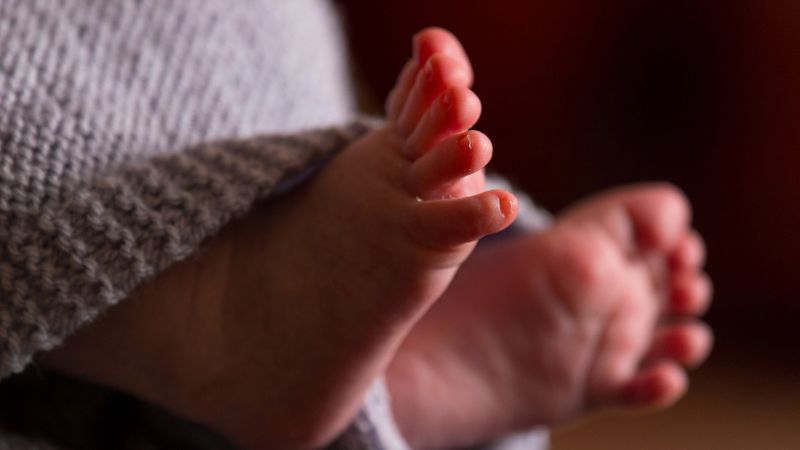A version of this story appeared in CNN’s What Matters newsletter. To get it in your inbox, sign up for free here . President Donald Trump has expressed some interest in the idea of giving new parents a $5,000 “baby bonus,” and a new CDC report shows the US fertility rate is hovering near a record low as younger people rethink parenthood.
But there is also a disconnect between the vague idea of spending taxpayer money to spark a baby boom and the drastic cuts in government spending and mass deportations the Trump administration is actively pursuing. Undocumented immigrants, despite having entered the country without authorization, risked everything to live in the US and also represent one answer to the related issues of declining birth rates and having enough workers to fund Social Security in the future. Trump’s government is also working hard to roll back work-from-home flexibility for federal workers, and sending a message to the private sector in the process.

That $5,000 baby bonus idea wouldn’t pay for more than a few months of day care in most of the country. Those details complicate any Trump administration calls for American women to have more babies. Simone and Malcolm Collins , pronatalism activists, say they have given the White House ideas for how to encourage Americans to have more kids.
Simone told CNN’s Pamela Brown on Thursday that $5,000 likely wouldn’t be enough to spark a change. Instead, pronatalists like the Collinses want to reset Americans’ priorities to glorify motherhood and encourage young people who are worried about the financial situation to instead get excited about families. “People are still living with their parents and they don’t have homes and they don’t have families because we’ve prioritized things like: first get educated, first go to college, first get your job, first get your house, first get all these things, and then maybe start dating and get married and have kids,” she said, arguing society is “out of whack.
” Pronatalists are having a moment, in part because of the worried-about-humanity musings of tech bros like Elon Musk, who has at least a baker’s dozen of offspring. Catherine Shoichet, one of the reporters who produced a CNN article about pronatalism earlier this month , flooded my inbox with studies on both sides of the pronatalist movement, but the bottom line is that evidence overwhelmingly shows that government efforts to encourage more babies can be very expensive and rarely work. But that doesn’t mean governments shouldn’t try.
The US currently spends a lot more money on its aging and retired population through Social Security and Medicare than it does encouraging people to have children. How much to worry about the falling US (and worldwide) birthrate is a matter of debate. Some of those most concerned about climate change and resource depletion , for example, may think falling birthrates have more benefits than risks.
Critics of pronatalism also warn that it seems like a potential slippery slope to restricting women’s reproductive choices and forcing people to have children they did not choose. And a lot of smart people think pronatalist predictions of civilization’s imminent collapse are overblown. What are the odds of a baby bonus happening? “Sounds like a good idea to me,” Trump said when a reporter asked him in the Oval Office about a New York Times report that mentioned the $5,000 proposal, among others.
That will encourage supporters of the idea, but it’s far short of an endorsement. On Capitol Hill, where lawmakers would have to vote for and figure how to pay for the idea, House Speaker Mike Johnson called the idea “creative,” but his colleagues are spending more time looking at how to slash social spending — on the Medicaid program that insures many young mothers, on food assistance and more — as they look for ways to extend Trump’s first-term tax cuts. Those tax cuts, by the way, did double, to $2,000, the popular tax credit parents and caregivers can claim for children.
The US has tried more generous incentives But Republicans generally opposed a far more generous tax credit for children that was included in a Covid relief bill passed by Democrats during the Biden administration and was made available as a subsidy payment even to parents whose earnings are so low they do not traditionally file tax returns. There have been bipartisan proposals to revive that “refundable” tax credit, which was essentially a check to parents, and Vice President JD Vance has endorsed the idea of increasing the annual child tax credit to $5,000, but the White House has not, at least so far. That short-term experiment, by essentially paying parents up to $3,600 per child, was credited with lowering the poverty rate for US children.
After it lapsed in 2022, the child poverty rate jumped, as CNN’s Tami Luhby wrote at the time . There have been other ideas, like efforts to help pay for child care for American kids, that also did not pass through Congress. Sen.
Cory Booker, the New Jersey Democrat, suggested “baby bonds” — investments at birth — to help all American kids eventually afford college or buy a home. The US is not a leader in supporting families The vast majority of countries in the world offer some kind of paid family leave for new mothers. A number of US states have such programs, but the federal government does not require companies to provide paid family leave and the latest in a long line of efforts to create one during the Biden administration failed.
Other countries, like Italy, Germany and Poland, among others, pay parents to have children. There is an “ upbringing benefit ” in Poland. Hong Kong pays parents $2,500 per child .
Hungary, led by Trump’s ally Viktor Orban, offers a $30,000 interest-free loan to young newlyweds that is forgiven if the bride has three children. Germany offers monthly payments to all parents, the “ kindergeld ,” as well as additional benefits for new parents and tax advantages. Its fertility rate, 1.
4 births per woman , is lower than US at 1.6 births per woman and much lower than the 2.1 births per woman needed to keep the population steady.
Would a baby bonus work? While payments to parents would certainly help shoulder some of the burden of parenthood, there is a lot of worldwide evidence that there’s not much to be done to actually reverse declining birth rates in developed countries. How do you create a societal shift? Should you? For decades, governments actually did things that contributed to declining birth rates. Giving women more access to education, opportunity in the workplace and access to birth control gave them more power over their lives.
The University of Maryland sociologist Philip Cohen, wrote for The Hill last fall that falling birth rates “swam with the tide of history” and anyone expecting to easily reverse birth rates is unlikely to be satisfied. “Everything about modern society pushed in the direction of fewer children, culturally and economically,” Cohen argued. “Reversing that tide is not just difficult — it’s impossible.
You can’t go back. We may someday achieve a global regime of sustainable birth rates, but that will be part of a new social order yet to be invented.”.















